Business Law Assignment: Analysis of Contract Breach between CM and GD
VerifiedAdded on 2022/09/14
|10
|2124
|9
Report
AI Summary
This business law assignment analyzes a contract breach between Commercial Malls Pty Ltd (CM) and Gourmando’s Delight (GD) using the IRAC method, focusing on Australian Contract and Consumer Law. The core issue is determining which party breached the lease agreement. The report examines the rules governing contracts, including the Competition and Consumer Act 2010 and Halsbury’s Laws of Australia, emphasizing contract formation, breach circumstances, and remedies. The application section evaluates the termination notice issued by CM to GD, concluding that CM breached the contract by improperly terminating the lease. The conclusion reinforces that CM's actions were a breach, entitling GD to remedies under contract law. References to legal resources support the analysis.
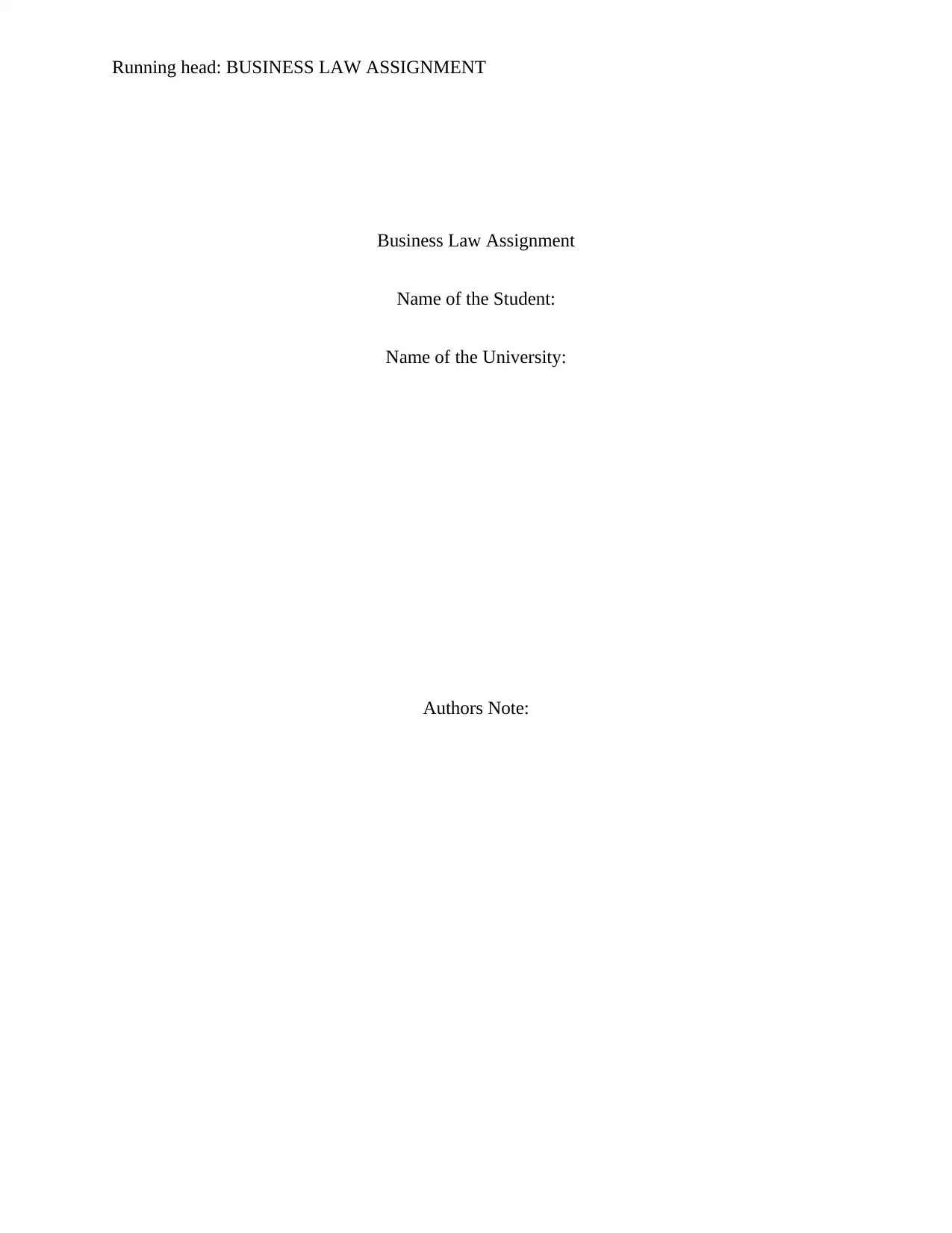
Running head: BUSINESS LAW ASSIGNMENT
Business Law Assignment
Name of the Student:
Name of the University:
Authors Note:
Business Law Assignment
Name of the Student:
Name of the University:
Authors Note:
Paraphrase This Document
Need a fresh take? Get an instant paraphrase of this document with our AI Paraphraser
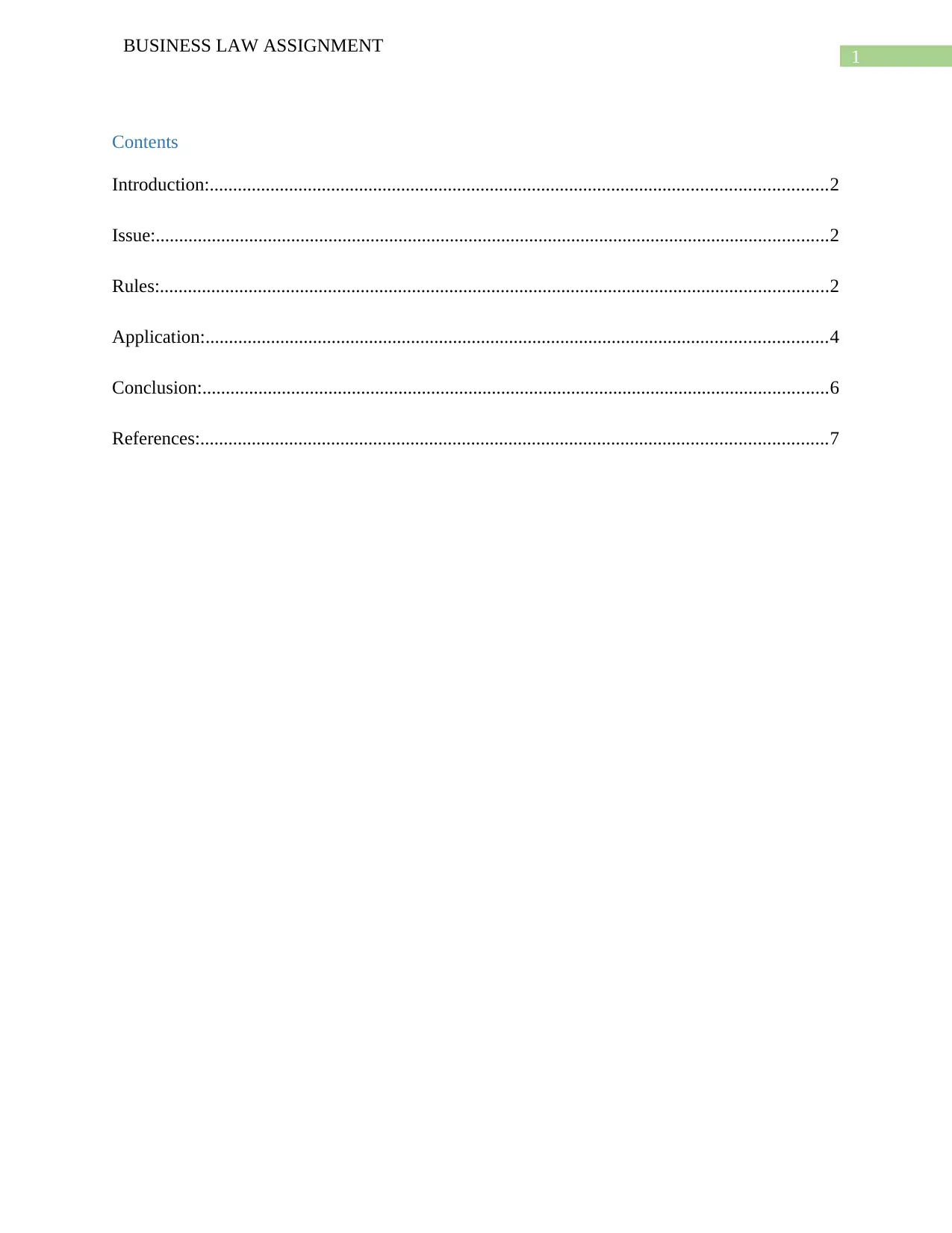
1
BUSINESS LAW ASSIGNMENT
Contents
Introduction:....................................................................................................................................2
Issue:................................................................................................................................................2
Rules:...............................................................................................................................................2
Application:.....................................................................................................................................4
Conclusion:......................................................................................................................................6
References:......................................................................................................................................7
BUSINESS LAW ASSIGNMENT
Contents
Introduction:....................................................................................................................................2
Issue:................................................................................................................................................2
Rules:...............................................................................................................................................2
Application:.....................................................................................................................................4
Conclusion:......................................................................................................................................6
References:......................................................................................................................................7
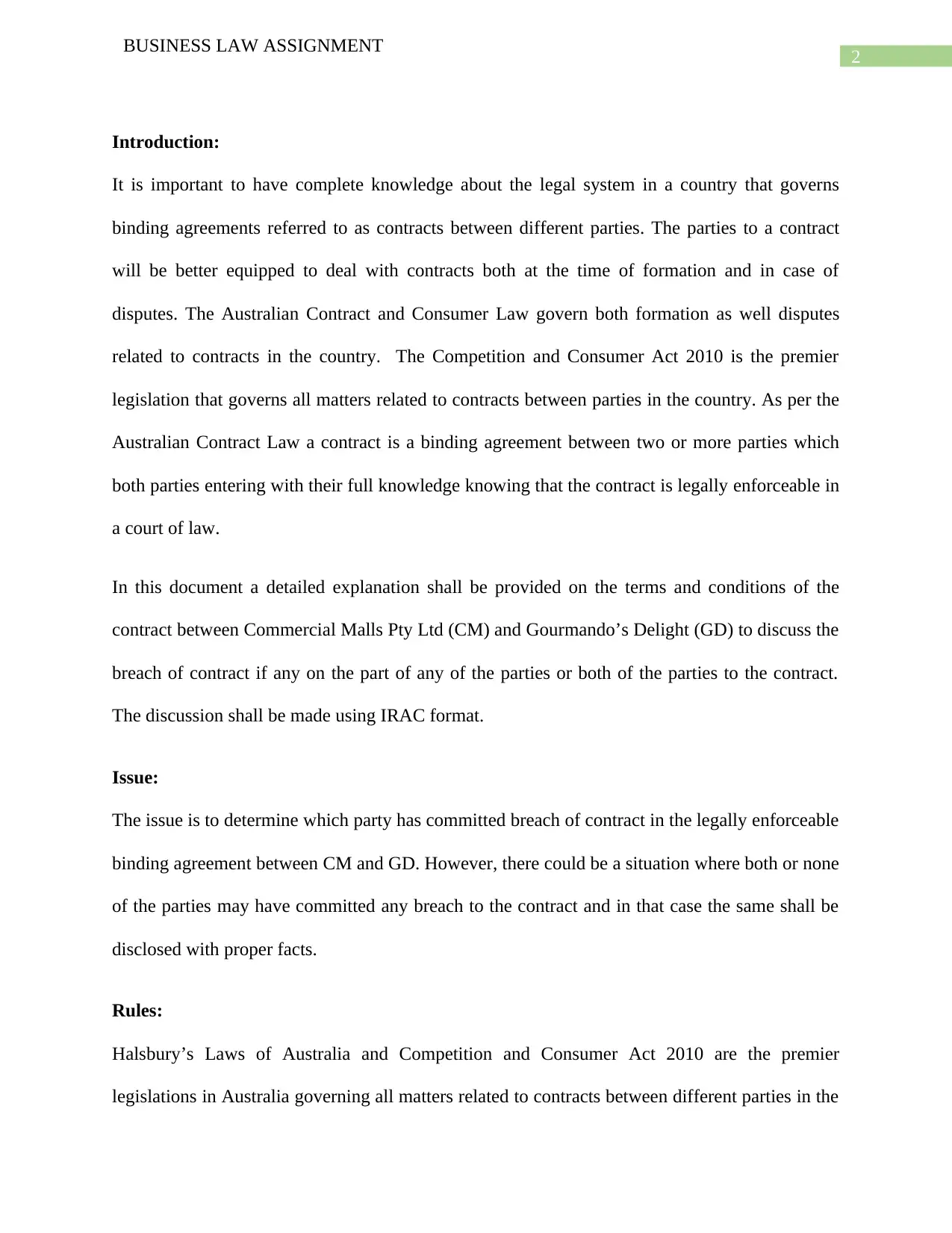
2
BUSINESS LAW ASSIGNMENT
Introduction:
It is important to have complete knowledge about the legal system in a country that governs
binding agreements referred to as contracts between different parties. The parties to a contract
will be better equipped to deal with contracts both at the time of formation and in case of
disputes. The Australian Contract and Consumer Law govern both formation as well disputes
related to contracts in the country. The Competition and Consumer Act 2010 is the premier
legislation that governs all matters related to contracts between parties in the country. As per the
Australian Contract Law a contract is a binding agreement between two or more parties which
both parties entering with their full knowledge knowing that the contract is legally enforceable in
a court of law.
In this document a detailed explanation shall be provided on the terms and conditions of the
contract between Commercial Malls Pty Ltd (CM) and Gourmando’s Delight (GD) to discuss the
breach of contract if any on the part of any of the parties or both of the parties to the contract.
The discussion shall be made using IRAC format.
Issue:
The issue is to determine which party has committed breach of contract in the legally enforceable
binding agreement between CM and GD. However, there could be a situation where both or none
of the parties may have committed any breach to the contract and in that case the same shall be
disclosed with proper facts.
Rules:
Halsbury’s Laws of Australia and Competition and Consumer Act 2010 are the premier
legislations in Australia governing all matters related to contracts between different parties in the
BUSINESS LAW ASSIGNMENT
Introduction:
It is important to have complete knowledge about the legal system in a country that governs
binding agreements referred to as contracts between different parties. The parties to a contract
will be better equipped to deal with contracts both at the time of formation and in case of
disputes. The Australian Contract and Consumer Law govern both formation as well disputes
related to contracts in the country. The Competition and Consumer Act 2010 is the premier
legislation that governs all matters related to contracts between parties in the country. As per the
Australian Contract Law a contract is a binding agreement between two or more parties which
both parties entering with their full knowledge knowing that the contract is legally enforceable in
a court of law.
In this document a detailed explanation shall be provided on the terms and conditions of the
contract between Commercial Malls Pty Ltd (CM) and Gourmando’s Delight (GD) to discuss the
breach of contract if any on the part of any of the parties or both of the parties to the contract.
The discussion shall be made using IRAC format.
Issue:
The issue is to determine which party has committed breach of contract in the legally enforceable
binding agreement between CM and GD. However, there could be a situation where both or none
of the parties may have committed any breach to the contract and in that case the same shall be
disclosed with proper facts.
Rules:
Halsbury’s Laws of Australia and Competition and Consumer Act 2010 are the premier
legislations in Australia governing all matters related to contracts between different parties in the
⊘ This is a preview!⊘
Do you want full access?
Subscribe today to unlock all pages.

Trusted by 1+ million students worldwide
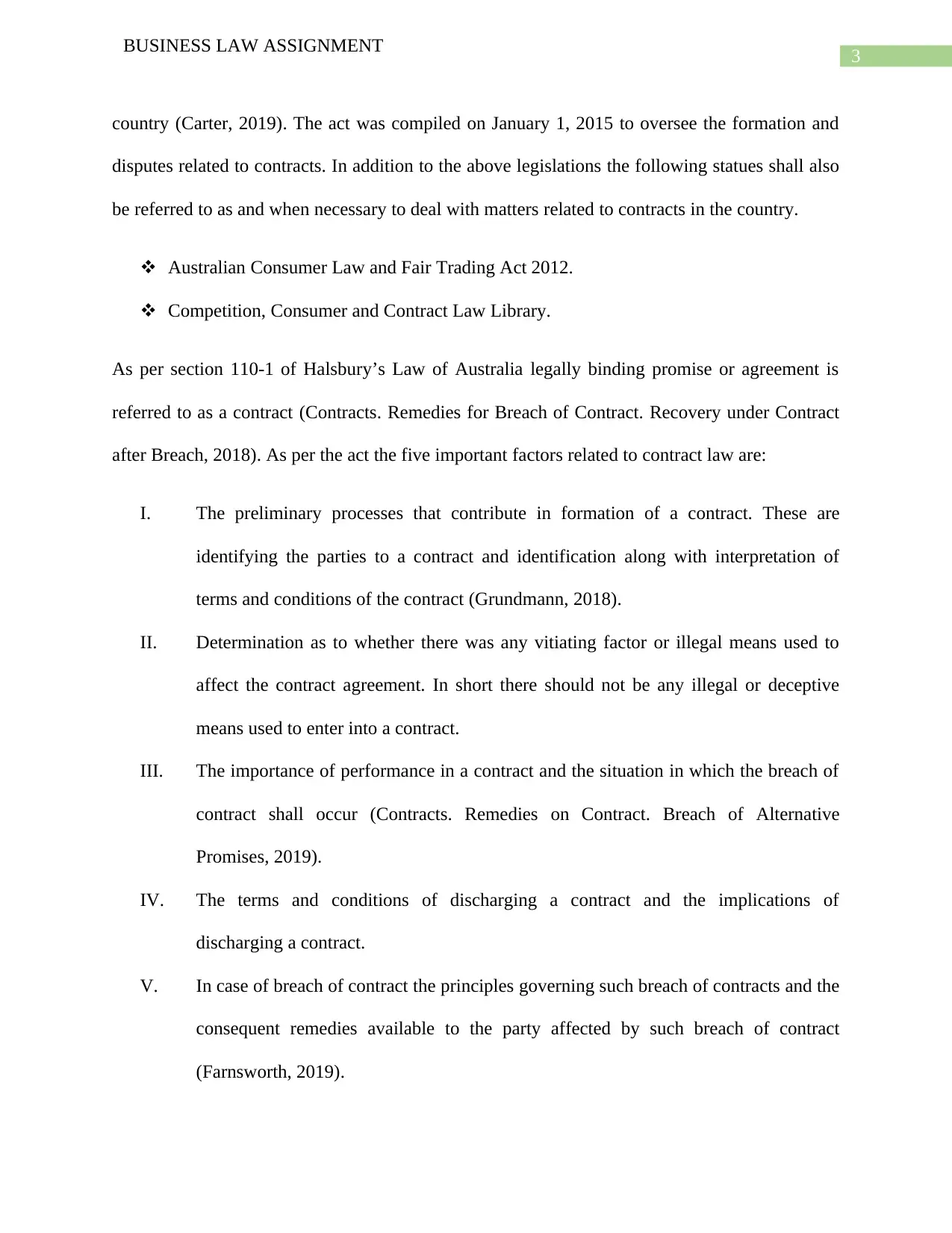
3
BUSINESS LAW ASSIGNMENT
country (Carter, 2019). The act was compiled on January 1, 2015 to oversee the formation and
disputes related to contracts. In addition to the above legislations the following statues shall also
be referred to as and when necessary to deal with matters related to contracts in the country.
Australian Consumer Law and Fair Trading Act 2012.
Competition, Consumer and Contract Law Library.
As per section 110-1 of Halsbury’s Law of Australia legally binding promise or agreement is
referred to as a contract (Contracts. Remedies for Breach of Contract. Recovery under Contract
after Breach, 2018). As per the act the five important factors related to contract law are:
I. The preliminary processes that contribute in formation of a contract. These are
identifying the parties to a contract and identification along with interpretation of
terms and conditions of the contract (Grundmann, 2018).
II. Determination as to whether there was any vitiating factor or illegal means used to
affect the contract agreement. In short there should not be any illegal or deceptive
means used to enter into a contract.
III. The importance of performance in a contract and the situation in which the breach of
contract shall occur (Contracts. Remedies on Contract. Breach of Alternative
Promises, 2019).
IV. The terms and conditions of discharging a contract and the implications of
discharging a contract.
V. In case of breach of contract the principles governing such breach of contracts and the
consequent remedies available to the party affected by such breach of contract
(Farnsworth, 2019).
BUSINESS LAW ASSIGNMENT
country (Carter, 2019). The act was compiled on January 1, 2015 to oversee the formation and
disputes related to contracts. In addition to the above legislations the following statues shall also
be referred to as and when necessary to deal with matters related to contracts in the country.
Australian Consumer Law and Fair Trading Act 2012.
Competition, Consumer and Contract Law Library.
As per section 110-1 of Halsbury’s Law of Australia legally binding promise or agreement is
referred to as a contract (Contracts. Remedies for Breach of Contract. Recovery under Contract
after Breach, 2018). As per the act the five important factors related to contract law are:
I. The preliminary processes that contribute in formation of a contract. These are
identifying the parties to a contract and identification along with interpretation of
terms and conditions of the contract (Grundmann, 2018).
II. Determination as to whether there was any vitiating factor or illegal means used to
affect the contract agreement. In short there should not be any illegal or deceptive
means used to enter into a contract.
III. The importance of performance in a contract and the situation in which the breach of
contract shall occur (Contracts. Remedies on Contract. Breach of Alternative
Promises, 2019).
IV. The terms and conditions of discharging a contract and the implications of
discharging a contract.
V. In case of breach of contract the principles governing such breach of contracts and the
consequent remedies available to the party affected by such breach of contract
(Farnsworth, 2019).
Paraphrase This Document
Need a fresh take? Get an instant paraphrase of this document with our AI Paraphraser
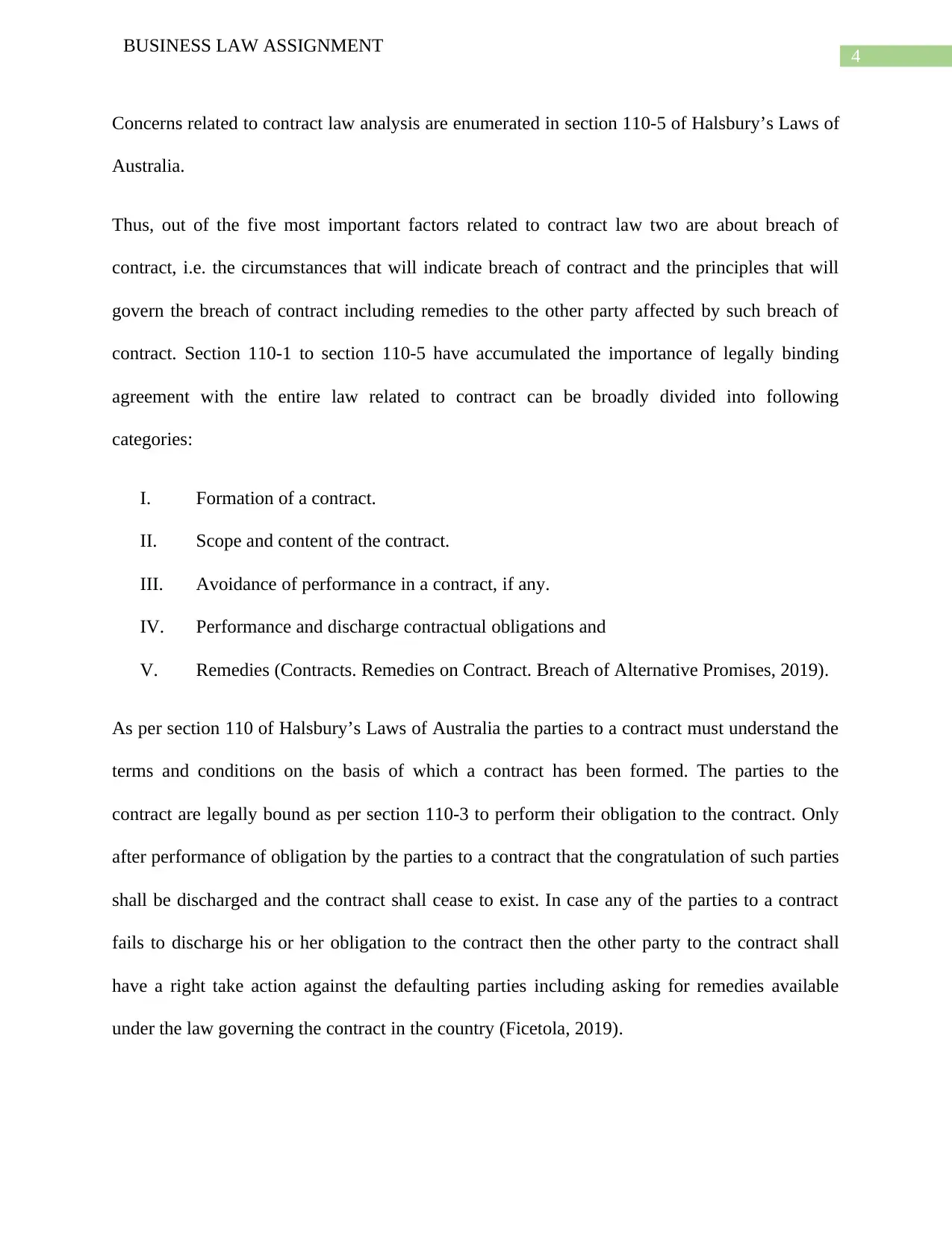
4
BUSINESS LAW ASSIGNMENT
Concerns related to contract law analysis are enumerated in section 110-5 of Halsbury’s Laws of
Australia.
Thus, out of the five most important factors related to contract law two are about breach of
contract, i.e. the circumstances that will indicate breach of contract and the principles that will
govern the breach of contract including remedies to the other party affected by such breach of
contract. Section 110-1 to section 110-5 have accumulated the importance of legally binding
agreement with the entire law related to contract can be broadly divided into following
categories:
I. Formation of a contract.
II. Scope and content of the contract.
III. Avoidance of performance in a contract, if any.
IV. Performance and discharge contractual obligations and
V. Remedies (Contracts. Remedies on Contract. Breach of Alternative Promises, 2019).
As per section 110 of Halsbury’s Laws of Australia the parties to a contract must understand the
terms and conditions on the basis of which a contract has been formed. The parties to the
contract are legally bound as per section 110-3 to perform their obligation to the contract. Only
after performance of obligation by the parties to a contract that the congratulation of such parties
shall be discharged and the contract shall cease to exist. In case any of the parties to a contract
fails to discharge his or her obligation to the contract then the other party to the contract shall
have a right take action against the defaulting parties including asking for remedies available
under the law governing the contract in the country (Ficetola, 2019).
BUSINESS LAW ASSIGNMENT
Concerns related to contract law analysis are enumerated in section 110-5 of Halsbury’s Laws of
Australia.
Thus, out of the five most important factors related to contract law two are about breach of
contract, i.e. the circumstances that will indicate breach of contract and the principles that will
govern the breach of contract including remedies to the other party affected by such breach of
contract. Section 110-1 to section 110-5 have accumulated the importance of legally binding
agreement with the entire law related to contract can be broadly divided into following
categories:
I. Formation of a contract.
II. Scope and content of the contract.
III. Avoidance of performance in a contract, if any.
IV. Performance and discharge contractual obligations and
V. Remedies (Contracts. Remedies on Contract. Breach of Alternative Promises, 2019).
As per section 110 of Halsbury’s Laws of Australia the parties to a contract must understand the
terms and conditions on the basis of which a contract has been formed. The parties to the
contract are legally bound as per section 110-3 to perform their obligation to the contract. Only
after performance of obligation by the parties to a contract that the congratulation of such parties
shall be discharged and the contract shall cease to exist. In case any of the parties to a contract
fails to discharge his or her obligation to the contract then the other party to the contract shall
have a right take action against the defaulting parties including asking for remedies available
under the law governing the contract in the country (Ficetola, 2019).
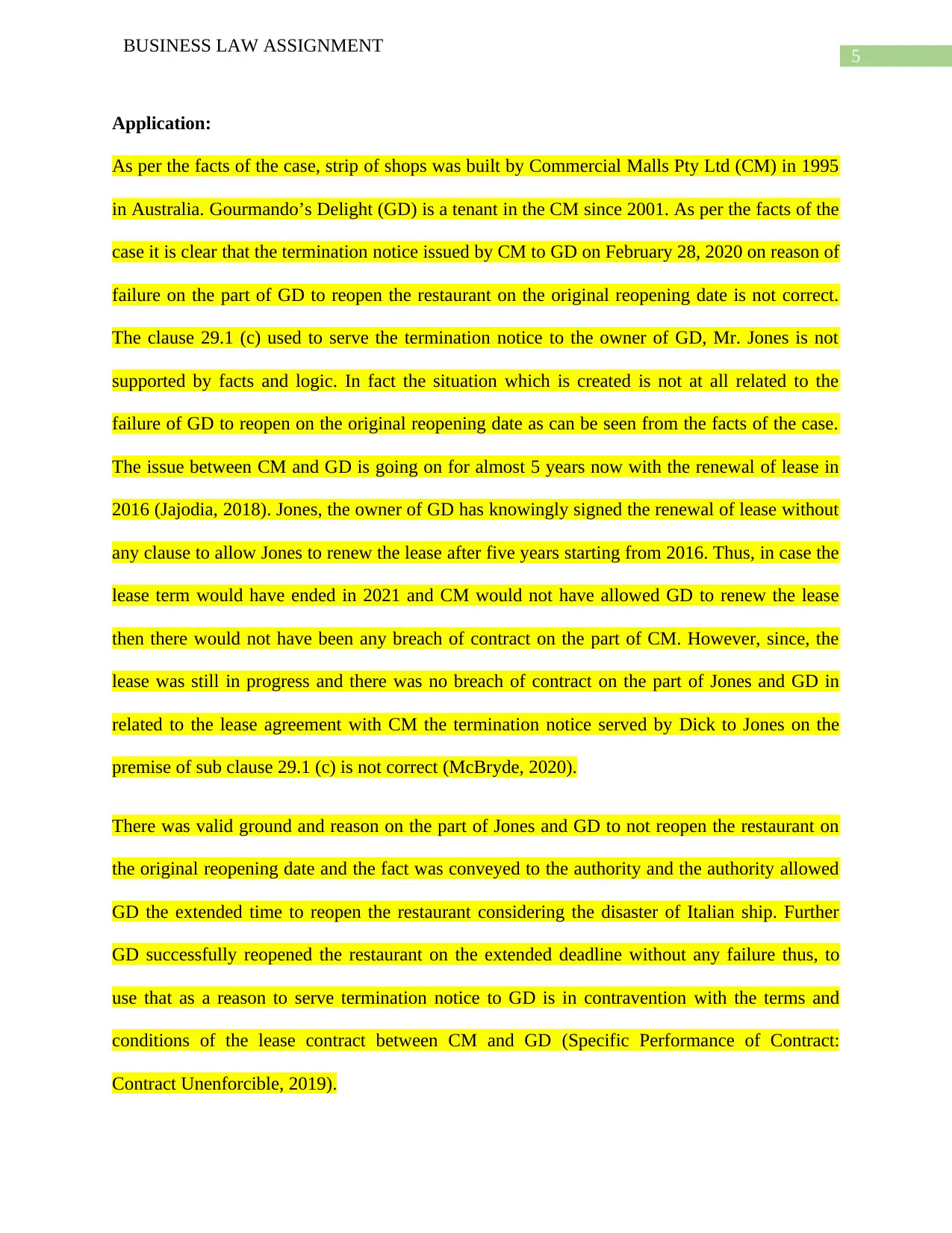
5
BUSINESS LAW ASSIGNMENT
Application:
As per the facts of the case, strip of shops was built by Commercial Malls Pty Ltd (CM) in 1995
in Australia. Gourmando’s Delight (GD) is a tenant in the CM since 2001. As per the facts of the
case it is clear that the termination notice issued by CM to GD on February 28, 2020 on reason of
failure on the part of GD to reopen the restaurant on the original reopening date is not correct.
The clause 29.1 (c) used to serve the termination notice to the owner of GD, Mr. Jones is not
supported by facts and logic. In fact the situation which is created is not at all related to the
failure of GD to reopen on the original reopening date as can be seen from the facts of the case.
The issue between CM and GD is going on for almost 5 years now with the renewal of lease in
2016 (Jajodia, 2018). Jones, the owner of GD has knowingly signed the renewal of lease without
any clause to allow Jones to renew the lease after five years starting from 2016. Thus, in case the
lease term would have ended in 2021 and CM would not have allowed GD to renew the lease
then there would not have been any breach of contract on the part of CM. However, since, the
lease was still in progress and there was no breach of contract on the part of Jones and GD in
related to the lease agreement with CM the termination notice served by Dick to Jones on the
premise of sub clause 29.1 (c) is not correct (McBryde, 2020).
There was valid ground and reason on the part of Jones and GD to not reopen the restaurant on
the original reopening date and the fact was conveyed to the authority and the authority allowed
GD the extended time to reopen the restaurant considering the disaster of Italian ship. Further
GD successfully reopened the restaurant on the extended deadline without any failure thus, to
use that as a reason to serve termination notice to GD is in contravention with the terms and
conditions of the lease contract between CM and GD (Specific Performance of Contract:
Contract Unenforcible, 2019).
BUSINESS LAW ASSIGNMENT
Application:
As per the facts of the case, strip of shops was built by Commercial Malls Pty Ltd (CM) in 1995
in Australia. Gourmando’s Delight (GD) is a tenant in the CM since 2001. As per the facts of the
case it is clear that the termination notice issued by CM to GD on February 28, 2020 on reason of
failure on the part of GD to reopen the restaurant on the original reopening date is not correct.
The clause 29.1 (c) used to serve the termination notice to the owner of GD, Mr. Jones is not
supported by facts and logic. In fact the situation which is created is not at all related to the
failure of GD to reopen on the original reopening date as can be seen from the facts of the case.
The issue between CM and GD is going on for almost 5 years now with the renewal of lease in
2016 (Jajodia, 2018). Jones, the owner of GD has knowingly signed the renewal of lease without
any clause to allow Jones to renew the lease after five years starting from 2016. Thus, in case the
lease term would have ended in 2021 and CM would not have allowed GD to renew the lease
then there would not have been any breach of contract on the part of CM. However, since, the
lease was still in progress and there was no breach of contract on the part of Jones and GD in
related to the lease agreement with CM the termination notice served by Dick to Jones on the
premise of sub clause 29.1 (c) is not correct (McBryde, 2020).
There was valid ground and reason on the part of Jones and GD to not reopen the restaurant on
the original reopening date and the fact was conveyed to the authority and the authority allowed
GD the extended time to reopen the restaurant considering the disaster of Italian ship. Further
GD successfully reopened the restaurant on the extended deadline without any failure thus, to
use that as a reason to serve termination notice to GD is in contravention with the terms and
conditions of the lease contract between CM and GD (Specific Performance of Contract:
Contract Unenforcible, 2019).
⊘ This is a preview!⊘
Do you want full access?
Subscribe today to unlock all pages.

Trusted by 1+ million students worldwide
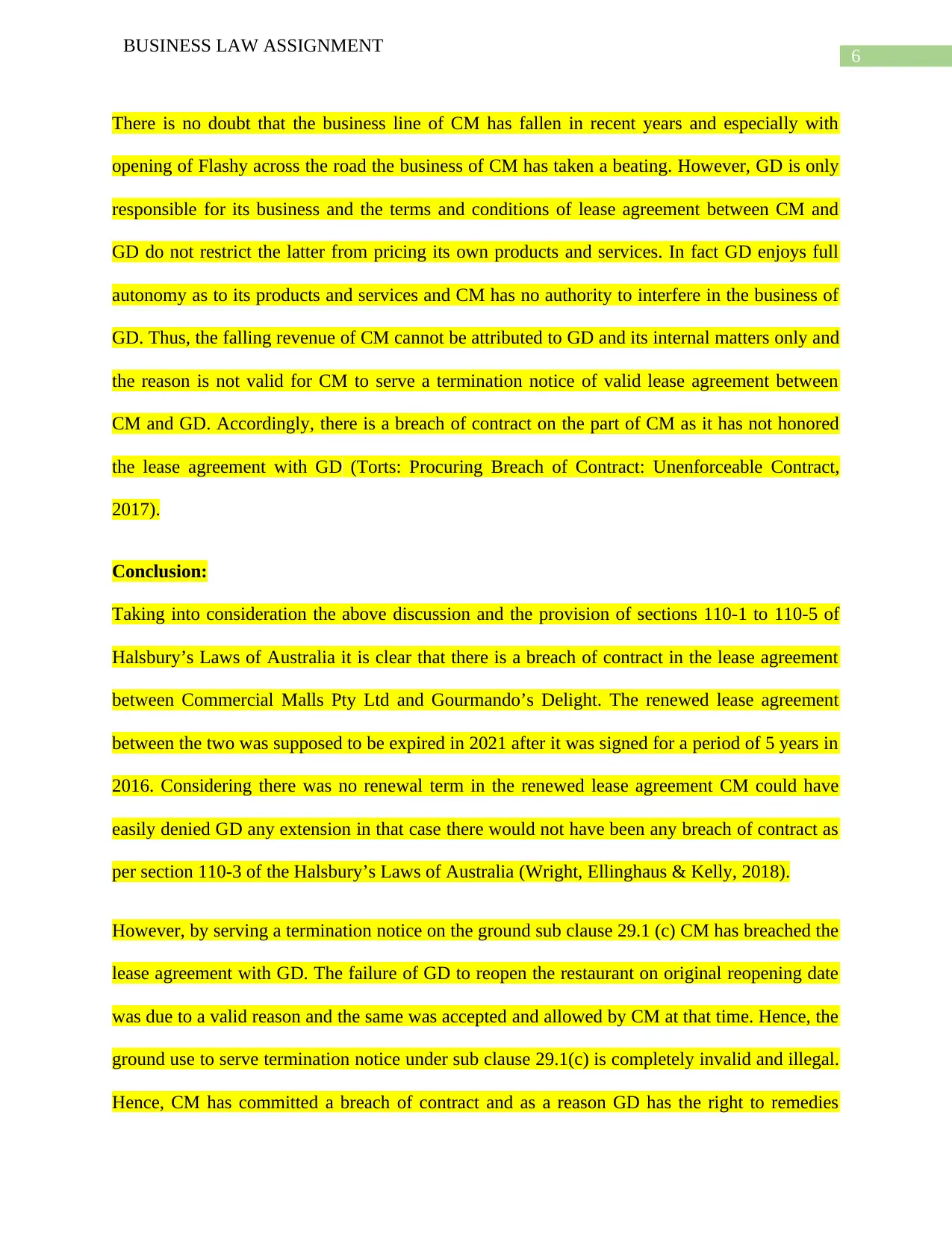
6
BUSINESS LAW ASSIGNMENT
There is no doubt that the business line of CM has fallen in recent years and especially with
opening of Flashy across the road the business of CM has taken a beating. However, GD is only
responsible for its business and the terms and conditions of lease agreement between CM and
GD do not restrict the latter from pricing its own products and services. In fact GD enjoys full
autonomy as to its products and services and CM has no authority to interfere in the business of
GD. Thus, the falling revenue of CM cannot be attributed to GD and its internal matters only and
the reason is not valid for CM to serve a termination notice of valid lease agreement between
CM and GD. Accordingly, there is a breach of contract on the part of CM as it has not honored
the lease agreement with GD (Torts: Procuring Breach of Contract: Unenforceable Contract,
2017).
Conclusion:
Taking into consideration the above discussion and the provision of sections 110-1 to 110-5 of
Halsbury’s Laws of Australia it is clear that there is a breach of contract in the lease agreement
between Commercial Malls Pty Ltd and Gourmando’s Delight. The renewed lease agreement
between the two was supposed to be expired in 2021 after it was signed for a period of 5 years in
2016. Considering there was no renewal term in the renewed lease agreement CM could have
easily denied GD any extension in that case there would not have been any breach of contract as
per section 110-3 of the Halsbury’s Laws of Australia (Wright, Ellinghaus & Kelly, 2018).
However, by serving a termination notice on the ground sub clause 29.1 (c) CM has breached the
lease agreement with GD. The failure of GD to reopen the restaurant on original reopening date
was due to a valid reason and the same was accepted and allowed by CM at that time. Hence, the
ground use to serve termination notice under sub clause 29.1(c) is completely invalid and illegal.
Hence, CM has committed a breach of contract and as a reason GD has the right to remedies
BUSINESS LAW ASSIGNMENT
There is no doubt that the business line of CM has fallen in recent years and especially with
opening of Flashy across the road the business of CM has taken a beating. However, GD is only
responsible for its business and the terms and conditions of lease agreement between CM and
GD do not restrict the latter from pricing its own products and services. In fact GD enjoys full
autonomy as to its products and services and CM has no authority to interfere in the business of
GD. Thus, the falling revenue of CM cannot be attributed to GD and its internal matters only and
the reason is not valid for CM to serve a termination notice of valid lease agreement between
CM and GD. Accordingly, there is a breach of contract on the part of CM as it has not honored
the lease agreement with GD (Torts: Procuring Breach of Contract: Unenforceable Contract,
2017).
Conclusion:
Taking into consideration the above discussion and the provision of sections 110-1 to 110-5 of
Halsbury’s Laws of Australia it is clear that there is a breach of contract in the lease agreement
between Commercial Malls Pty Ltd and Gourmando’s Delight. The renewed lease agreement
between the two was supposed to be expired in 2021 after it was signed for a period of 5 years in
2016. Considering there was no renewal term in the renewed lease agreement CM could have
easily denied GD any extension in that case there would not have been any breach of contract as
per section 110-3 of the Halsbury’s Laws of Australia (Wright, Ellinghaus & Kelly, 2018).
However, by serving a termination notice on the ground sub clause 29.1 (c) CM has breached the
lease agreement with GD. The failure of GD to reopen the restaurant on original reopening date
was due to a valid reason and the same was accepted and allowed by CM at that time. Hence, the
ground use to serve termination notice under sub clause 29.1(c) is completely invalid and illegal.
Hence, CM has committed a breach of contract and as a reason GD has the right to remedies
Paraphrase This Document
Need a fresh take? Get an instant paraphrase of this document with our AI Paraphraser

7
BUSINESS LAW ASSIGNMENT
available as per the contract law. The remedies in this case will include the full damages suffered
by GD due to the wrongful breach of contract by CM including emotional trauma however, the
extension of 5 years is not to be upheld (Whittaker, 2018).
BUSINESS LAW ASSIGNMENT
available as per the contract law. The remedies in this case will include the full damages suffered
by GD due to the wrongful breach of contract by CM including emotional trauma however, the
extension of 5 years is not to be upheld (Whittaker, 2018).
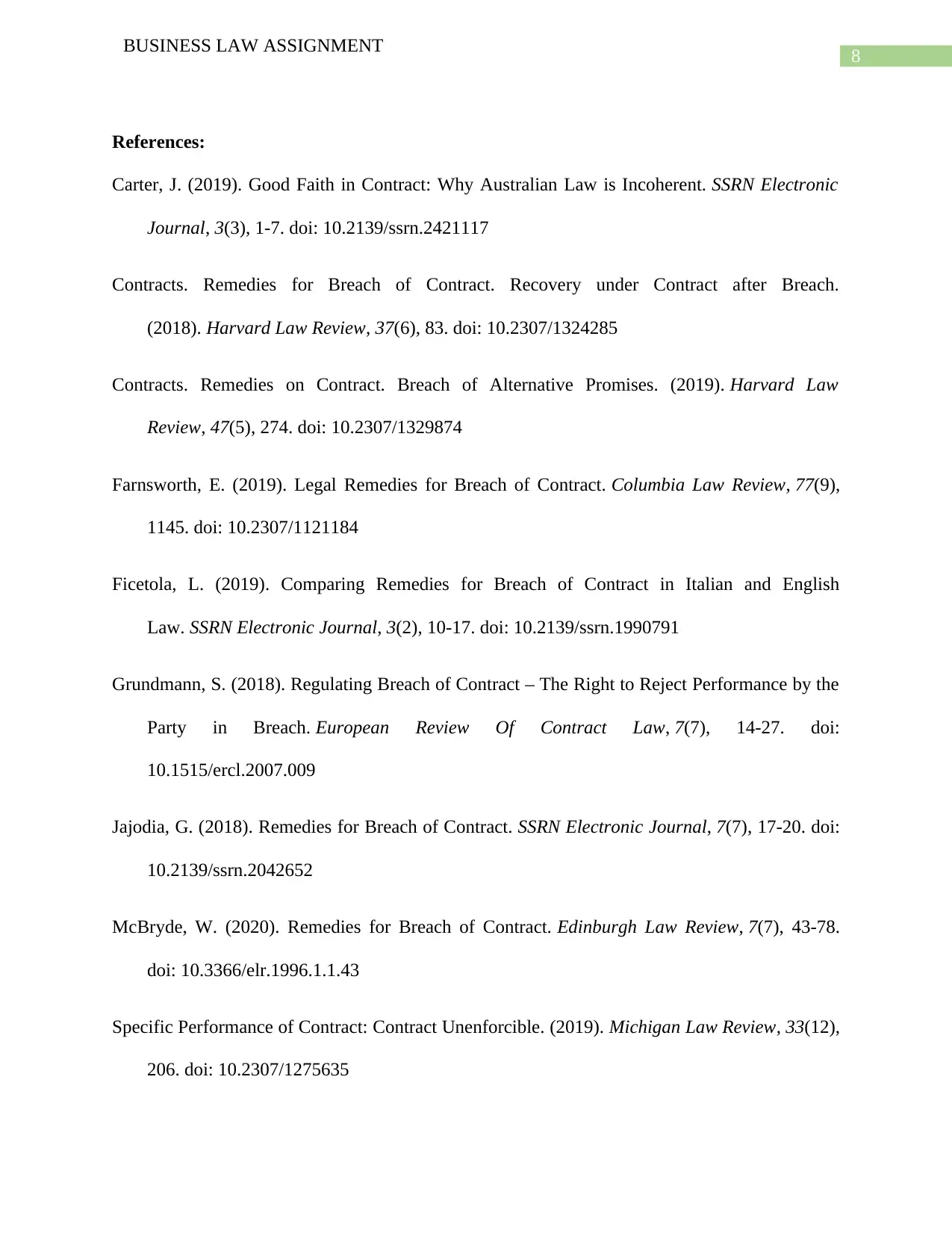
8
BUSINESS LAW ASSIGNMENT
References:
Carter, J. (2019). Good Faith in Contract: Why Australian Law is Incoherent. SSRN Electronic
Journal, 3(3), 1-7. doi: 10.2139/ssrn.2421117
Contracts. Remedies for Breach of Contract. Recovery under Contract after Breach.
(2018). Harvard Law Review, 37(6), 83. doi: 10.2307/1324285
Contracts. Remedies on Contract. Breach of Alternative Promises. (2019). Harvard Law
Review, 47(5), 274. doi: 10.2307/1329874
Farnsworth, E. (2019). Legal Remedies for Breach of Contract. Columbia Law Review, 77(9),
1145. doi: 10.2307/1121184
Ficetola, L. (2019). Comparing Remedies for Breach of Contract in Italian and English
Law. SSRN Electronic Journal, 3(2), 10-17. doi: 10.2139/ssrn.1990791
Grundmann, S. (2018). Regulating Breach of Contract – The Right to Reject Performance by the
Party in Breach. European Review Of Contract Law, 7(7), 14-27. doi:
10.1515/ercl.2007.009
Jajodia, G. (2018). Remedies for Breach of Contract. SSRN Electronic Journal, 7(7), 17-20. doi:
10.2139/ssrn.2042652
McBryde, W. (2020). Remedies for Breach of Contract. Edinburgh Law Review, 7(7), 43-78.
doi: 10.3366/elr.1996.1.1.43
Specific Performance of Contract: Contract Unenforcible. (2019). Michigan Law Review, 33(12),
206. doi: 10.2307/1275635
BUSINESS LAW ASSIGNMENT
References:
Carter, J. (2019). Good Faith in Contract: Why Australian Law is Incoherent. SSRN Electronic
Journal, 3(3), 1-7. doi: 10.2139/ssrn.2421117
Contracts. Remedies for Breach of Contract. Recovery under Contract after Breach.
(2018). Harvard Law Review, 37(6), 83. doi: 10.2307/1324285
Contracts. Remedies on Contract. Breach of Alternative Promises. (2019). Harvard Law
Review, 47(5), 274. doi: 10.2307/1329874
Farnsworth, E. (2019). Legal Remedies for Breach of Contract. Columbia Law Review, 77(9),
1145. doi: 10.2307/1121184
Ficetola, L. (2019). Comparing Remedies for Breach of Contract in Italian and English
Law. SSRN Electronic Journal, 3(2), 10-17. doi: 10.2139/ssrn.1990791
Grundmann, S. (2018). Regulating Breach of Contract – The Right to Reject Performance by the
Party in Breach. European Review Of Contract Law, 7(7), 14-27. doi:
10.1515/ercl.2007.009
Jajodia, G. (2018). Remedies for Breach of Contract. SSRN Electronic Journal, 7(7), 17-20. doi:
10.2139/ssrn.2042652
McBryde, W. (2020). Remedies for Breach of Contract. Edinburgh Law Review, 7(7), 43-78.
doi: 10.3366/elr.1996.1.1.43
Specific Performance of Contract: Contract Unenforcible. (2019). Michigan Law Review, 33(12),
206. doi: 10.2307/1275635
⊘ This is a preview!⊘
Do you want full access?
Subscribe today to unlock all pages.

Trusted by 1+ million students worldwide
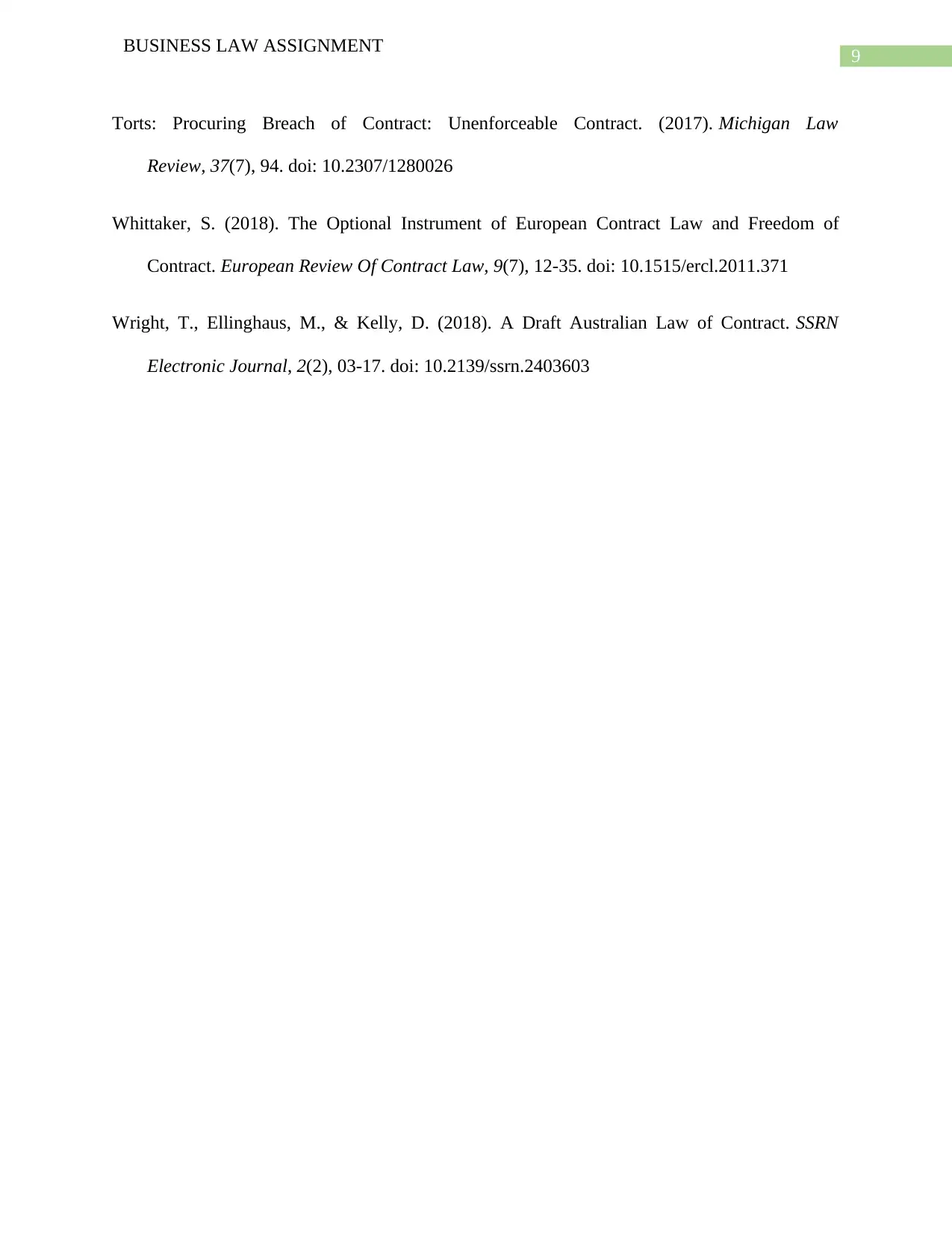
9
BUSINESS LAW ASSIGNMENT
Torts: Procuring Breach of Contract: Unenforceable Contract. (2017). Michigan Law
Review, 37(7), 94. doi: 10.2307/1280026
Whittaker, S. (2018). The Optional Instrument of European Contract Law and Freedom of
Contract. European Review Of Contract Law, 9(7), 12-35. doi: 10.1515/ercl.2011.371
Wright, T., Ellinghaus, M., & Kelly, D. (2018). A Draft Australian Law of Contract. SSRN
Electronic Journal, 2(2), 03-17. doi: 10.2139/ssrn.2403603
BUSINESS LAW ASSIGNMENT
Torts: Procuring Breach of Contract: Unenforceable Contract. (2017). Michigan Law
Review, 37(7), 94. doi: 10.2307/1280026
Whittaker, S. (2018). The Optional Instrument of European Contract Law and Freedom of
Contract. European Review Of Contract Law, 9(7), 12-35. doi: 10.1515/ercl.2011.371
Wright, T., Ellinghaus, M., & Kelly, D. (2018). A Draft Australian Law of Contract. SSRN
Electronic Journal, 2(2), 03-17. doi: 10.2139/ssrn.2403603
1 out of 10
Related Documents
Your All-in-One AI-Powered Toolkit for Academic Success.
+13062052269
info@desklib.com
Available 24*7 on WhatsApp / Email
![[object Object]](/_next/static/media/star-bottom.7253800d.svg)
Unlock your academic potential
Copyright © 2020–2026 A2Z Services. All Rights Reserved. Developed and managed by ZUCOL.





